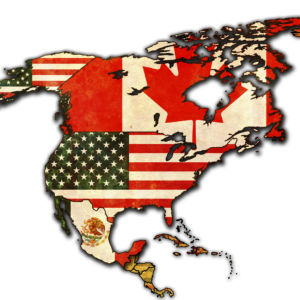The decision by the United Kingdom to leave the European Union gives North America a unique opportunity to assert its economic and political leadership among Western democracies. We are already the largest single economic bloc in the world, and, at a time of intense skepticism, we can show how increased trade and economic integration brings prosperity.
Our own economic union, the North American Free Trade Agreement, has been working well for a quarter-century. In the face of wave of misguided isolationism, it’s time to make it world’s most competitive and powerful exporting platform.
Economic malaise has been haunting Europe for two decades, and the Brexit vote seemed to pin the blame on economic openness. That is precisely the wrong culprit. In fact, as NAFTA has demonstrated, trade is a powerful engine of growth, innovation and investment in human capital — all critical to promoting a more balanced and inclusive economy.
I have been puzzled by criticisms of NAFTA. Since it went into force, U.S. manufacturing exports to Mexico and Canada have increased 258 percent, with exports of computer and electronic products, furniture, paper, and fabricated metals more than tripling. The U.S. maintains a large and growing manufacturing trade surplus with my country and Canada.
We need more trade and integration, not less. That was the message of last month’s Summit of North American Leaders held in Canada. That meeting took the first step in developing a common strategy to face the challenges that the rise of other blocs, especially the Asian Pacific region, are creating.
Consider agriculture. NAFTA has become the world’s single most important source of food – and the most reliable supplier at a time when urbanization and climate change are putting new pressures on agricultural systems all over the world. Mexico is the 12th largest global food exporter, Canada is fourth, and the U.S. is first. All of us promote agricultural practices that boost productivity and protect natural resources.
Mexico is a founding member of the Global Alliance for Smart-Climate Agriculture, a United Nations initiative to reduce greenhouse gas emissions from agriculture. We have a cooperation project to improve the resilience of agriculture by building climate hubs in arid and tropical zones in Mexico.
Last year, Mexico exported $22 billion worth of agricultural products to the U.S., our number-one market destination while the U.S. sent $18.5 billion worth to Mexico, the third-largest market for U.S. food exports after China and Canada. Mexico supplies about two-thirds of the horticultural products and about one-third of the fruits entering the United States.
Right now, 6 million U. S. jobs depend on trade with Mexico and the number is rising. U.S. border states are highly integrated to the Mexican economy. Exports from Texas to Mexico totaled $95 billion last year, or $12,000 for every Texas household.
By combining our respective comparative advantages with existing port and transport infrastructure, the Western Hemisphere has become an international leader in cereals, pork, beef, fruits and vegetables, beverages like beer and tequila, dairy and processed products.
Mexico is working hard to further develop its logistics networks for agriculture, improving sanitary inspections, quality controls, stock management and tracking of goods. We are encouraging small producers, especially, to become part of an integrated and highly efficient value chain that, without a doubt, will be the cornerstone for NAFTA’s future competitiveness.
Since NAFTA, Mexico has showed a strong commitment to maintain a stable and financially sound macroeconomic environment, plus policies friendly toward trade and foreign investments. Unlike many emerging markets, now in turbulence, our GDP continues to grow briskly and consistently, and we have become a major destination for international investments. Queretaro, the central Mexican state where I was formerly governor, hosts such global companies as Siemens, General Electric, Bombardier, and Samsung.
In Latin America, Mexico has taken the lead in promoting cooperation and economic integration through initiatives such as the Pacific Alliance with Chile, Colombia and Peru. And we have a critical role to play in new agreements like the Transpacific Partnership. At a time when the EU is losing its third-largest economy, our own Western Hemisphere alliance needs to grow even stronger.

